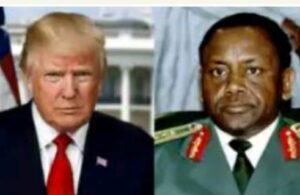Trump Shutdown DOJ Unit Investigating Sani Abacha Stolen Loots
Trump Shutdown DOJ Unit Investigating Sani Abacha Stolen Loots

U.S. President Donald Trump has dismantled a key Department of Justice (DOJ) unit dedicated to tracing and recovering billions in stolen assets from corrupt foreign leaders, including former Nigerian dictator, Gen. Sani Abacha.
The Kleptocracy Asset Recovery Initiative, which was responsible for investigating high-profile financial crimes such as the 1MDB scandal and the recovery of funds linked to Abacha’s regime, was quietly shut down under the direction of Attorney General Pam Bondi. The decision, revealed through a memo obtained by Reuters, states that resources will now be redirected to focus on fighting drug cartels and international criminal gangs.
Launched in 2010, the Kleptocracy Initiative aimed to combat large-scale corruption and recover stolen public funds, playing a pivotal role in cases involving corrupt African officials and Russian oligarchs. In the case of Abacha, the U.S. DOJ secured the forfeiture of $23 million in 2022, contributing to a total of $334.7 million in recoveries, which were subsequently repatriated to Nigeria.
The DOJ task force also investigated corruption linked to Nigeria’s oil sector, including cases involving former Petroleum Minister Diezani Alison-Madueke. Nigerian businessmen Kolawole Akanni Aluko and Olajide Omokore were accused of bribing Alison-Madueke in exchange for lucrative oil contracts, laundering over $100 million through U.S. systems. The U.S. government agreed to transfer $52.88 million in 2024 to Nigeria from these assets.
The closure of the Kleptocracy Initiative raises concerns over the future of anti-corruption efforts globally. Critics fear that the weakening of U.S. efforts to target financial crimes and illicit funds could embolden corrupt leaders and facilitate the movement of illicit wealth through global financial systems. The directive is set to take effect for at least 90 days, with the possibility of extension or permanent implementation, and prosecutors from the disbanded unit will revert to their original positions.
Andrew Adams, the former leader of the task force, has stated that while investigations may continue, the shift in priorities will likely slow the pace of charges against facilitators of corruption, particularly in relation to Russian
oligarchs.
TRENDING SONGS
 RCCG PASTOR ANGRY OVER CALLING Him“MR” INSTEAD OF “DR,” DECLARES CURSE ONLINE
RCCG PASTOR ANGRY OVER CALLING Him“MR” INSTEAD OF “DR,” DECLARES CURSE ONLINE
 NPMA Appeals to Nigerian Government for Compensation After Lagos Market Fire
NPMA Appeals to Nigerian Government for Compensation After Lagos Market Fire
 Rest Every Four Hours, FRSC Issues Safety Guide for Fasting Motorists
Rest Every Four Hours, FRSC Issues Safety Guide for Fasting Motorists
 NNPC Boss Ojulari Bags UK Energy Institute Fellowship
NNPC Boss Ojulari Bags UK Energy Institute Fellowship
 Shock in Anambra: Bride Disappears Moments Before Wedding
Shock in Anambra: Bride Disappears Moments Before Wedding
 Nigerian Woman Returns ₦330 Million Accidentally Credited to Her Account
Nigerian Woman Returns ₦330 Million Accidentally Credited to Her Account
 APC Don Reach Morocco?’ VeryDarkMan Reacts to Seyi Tinubu Poster
APC Don Reach Morocco?’ VeryDarkMan Reacts to Seyi Tinubu Poster
 Bride Breaks Down in Tears as Wedding Meals Were Kept Secretly While Guests Go Home Hungry
Bride Breaks Down in Tears as Wedding Meals Were Kept Secretly While Guests Go Home Hungry
 Odogwu by Day, Robber by Night: How Marriage Joy Turned Into Tragedy
Odogwu by Day, Robber by Night: How Marriage Joy Turned Into Tragedy
 Nigerian Officials Allegedly Pocket N4–6B Weekly Through Smuggling Cartels at Seme–Badagry Border
Nigerian Officials Allegedly Pocket N4–6B Weekly Through Smuggling Cartels at Seme–Badagry Border
Share this post with your friends on ![]()













